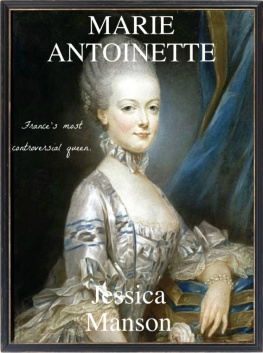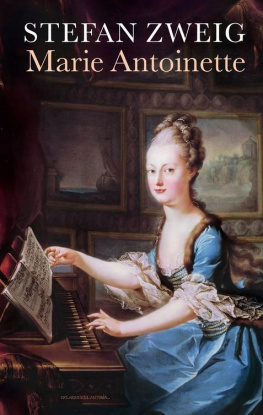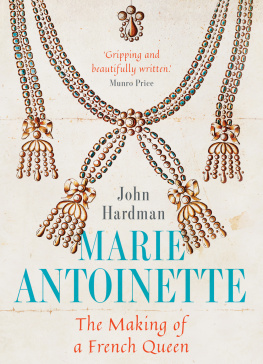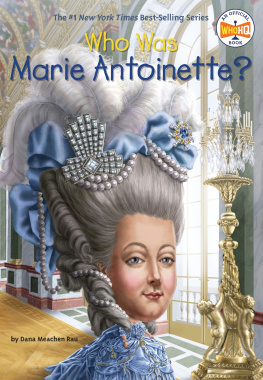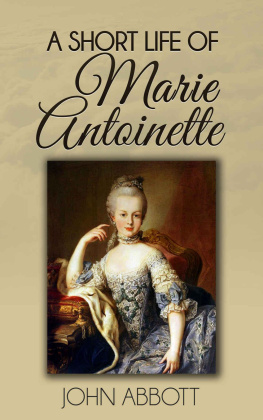Juliet Grey - Becoming Marie Antoinette
Here you can read online Juliet Grey - Becoming Marie Antoinette full text of the book (entire story) in english for free. Download pdf and epub, get meaning, cover and reviews about this ebook. year: 2011, publisher: Ballantine Books, genre: Non-fiction. Description of the work, (preface) as well as reviews are available. Best literature library LitArk.com created for fans of good reading and offers a wide selection of genres:
Romance novel
Science fiction
Adventure
Detective
Science
History
Home and family
Prose
Art
Politics
Computer
Non-fiction
Religion
Business
Children
Humor
Choose a favorite category and find really read worthwhile books. Enjoy immersion in the world of imagination, feel the emotions of the characters or learn something new for yourself, make an fascinating discovery.

- Book:Becoming Marie Antoinette
- Author:
- Publisher:Ballantine Books
- Genre:
- Year:2011
- Rating:5 / 5
- Favourites:Add to favourites
- Your mark:
- 100
- 1
- 2
- 3
- 4
- 5
Becoming Marie Antoinette: summary, description and annotation
We offer to read an annotation, description, summary or preface (depends on what the author of the book "Becoming Marie Antoinette" wrote himself). If you haven't found the necessary information about the book — write in the comments, we will try to find it.
Becoming Marie Antoinette — read online for free the complete book (whole text) full work
Below is the text of the book, divided by pages. System saving the place of the last page read, allows you to conveniently read the book "Becoming Marie Antoinette" online for free, without having to search again every time where you left off. Put a bookmark, and you can go to the page where you finished reading at any time.
Font size:
Interval:
Bookmark:
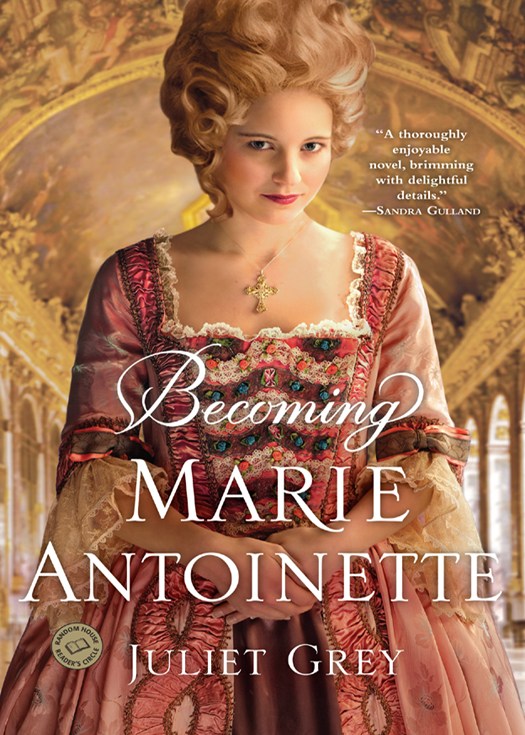
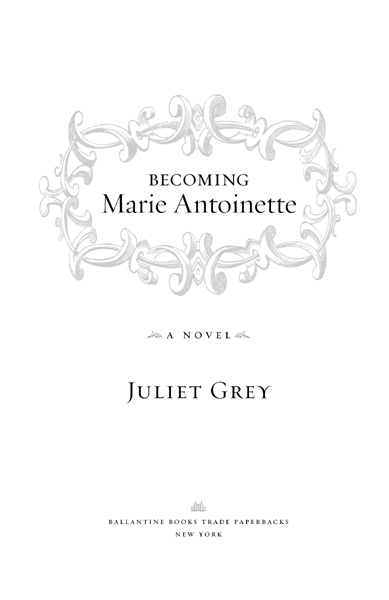
Becoming Marie Antoinette is a work of historical fiction. Apart from the well-known actual people, events, and locales that figure in the narrative, all names, characters, places, and incidents are the products of the authors imagination or are used fictitiously. Any resemblance to current events or locales, or to living persons, is entirely coincidental.
A Ballantine Books Trade Paperback Original
Copyright 2011 by Leslie Carroll
Reading group guide copyright 2011 by Random House, Inc.
Excerpt from Days of Splendor, Days of Sorrow by Juliet Grey copyright 2011 by Leslie Carroll
All rights reserved.
Published in the United States by Ballantine Books, an imprint of The Random House Publishing Group, a division of Random House, Inc., New York.
B ALLANTINE B OOKS and colophon are registered trademarks of Random House, Inc.
R ANDOM H OUSE R EADERS C IRCLE & Design is a trademark of Random House, Inc.
This book contains an excerpt from the forthcoming novel Days of Splendor, Days of Sorrow by Juliet Grey.
This excerpt has been set for this edition only and may not reflect the final content of the forthcoming edition.
Library of Congress Cataloging-in-Publication Data
Grey, Juliet.
Becoming Marie Antoinette : a novel / Juliet Grey.
p. cm.
eISBN: 978-0-345-52387-7
1. Marie Antoinette Queen, consort of Louis XVI, King of France, 17551793Fiction. 2. FranceHistoryLouis XVI, 17741793Fiction. 3. Queens
FranceFiction. I. Title.
PS3607.R4993B43 2011
813.6dc22 2011010024
www.randomhousereaderscircle.com
Cover images: Mike Houska (woman), Jose Ignacio Soto/Shutterstock (Versailles)
v3.1
For Nell
Bella gerant alii; tu, felix Austria, nube.
Others wage wars; you, happy Austria, marry.
MOTTO OF THE HAPSBURG DYNASTY
Is This the End of Childhood?
 S CHNBRUNN , M AY 1766
S CHNBRUNN , M AY 1766 
My mother liked to boast that her numerous daughters were sacrifices to politics. I never dared admit to Maman, who was Empress of the Holy Roman Empire, that the phrase terrified me more than she could know. Every time she said it, my imagination painted a violent tableau of Abraham and Isaac.
Unflinchingly pragmatic, Maman prepared us to accept our destinies not only with grace and equanimity but with a minimal amount of fuss. Thus, I had been schooled to expect, as sure as summer follows spring, that one day my carefree life as the youngest archduchess of Austria would forever change. What I never anticipated was that the day in question would come so soon.
In the company of my beloved sister, Charlotte, I was enjoying an idyllic afternoon on the verdant hillside above the palace of Schnbrunn, indulging in one of our favorite pastimesavoiding our lessons by distracting our governess, the Countess von Brandeiss.
A bumblebee hummed lazily about our heads, mistaking our pomaded and powdered hair for dulcet blossoms. Charlotte had kicked off her blue brocaded slippers and was wiggling her stockinged feet in the freshly cut grass. So I did the same, delighting in the coolness of the lawn, slightly damp against the soles of my feet, although wed surely merit a scolding for staining our white hose. Affecting a grim expression and pressing my chin to my chest until I achieved our mothers jowly appearance, in a dreadfully stern voice I said, At your age, Charlott-ah, you should know better than to lead the little one into childish games.
My sister laughed. Mein Gott, you sound just like her!
Countess von Brandeiss suppressed a smile, hiding her little yellow teeth. And you should know better than to mock your mother, Madame Antonia.
Ouf! Startled by the bee, which now appeared to be inspecting with some curiosity the ruffles of her bonnet, our governess began to bat the air about her head. Nearly tripping over her voluminous skirts as she leapt to her feet in fright, Madame von Brandeiss began to hop about in such a comical fashion that it was impossible for us to feel even the slightest bit chastised.
Mamans scoldings were so easy to duplicate because they came with far more regularity than her compliments. From middle spring through the warm, waning days of September, she was a familiar presence in our lives, tending to affairs of state from the outskirts of Vienna in our summer palace of Schnbrunn, a grand edifice of ocher and white that resembled a giant tea loaf piped with Schlag, whipped cream. With scrubbed faces we were presented to her in the Breakfast Room, its walls, the color of fresh milk, partitioned into symmetrical panels by gilded moldings and scrollwork. Charlotte, Ferdinand, Maxl, and I looked forward to the day when we would be old enough to merit an invitation to join her, along with our older siblings, for a steaming pot of fragrant coffee and terribly adult conversation about places like Poland and Silesia, places I remained unable to locate on the map of Europe that hung on the wall of our schoolroom.
For the remainder of the year, when the prodigious Hapsburg family resided at the gray and labyrinthine Hofburg palace in the heart of Vienna, we, the youngest of the empresss brood, scarcely saw Maman more than once every ten days. We even attended daily Mass without her, a line of ducklings, dressed in our finest clothes, kneeling on velvet cushions that bore our initials embroidered in silver thread. Charlotte and I remained side by side as our pastel-colored skirts, widened by the basketlike panniers beneath them, nudged each other; our heads swam with the pungent aroma of incense while our ears rang with ritualthe resonance of the grand pipe organ and the bishops solemn intonations in Latin.
And as the days grew shorter we began to forget the woman who had almost dared to have fun during those departed sunlit months. Mother became matriarch: a forbidding figure clad all in black, her skirts making her appear nearly as wide as she was tall. Marched into her study for inspection, we would stand still as statuesno fidgeting allowedwhile she peered at us through a gilt-edged magnifying glass and inquired of our governess whether we were learning our lessons, eating healthy meals, using tooth powder, and scrubbing our necks and behind our ears. The royal physician, Dr. Wansvietten, was put through the same paces with questions about our general health. The answers were invariably in the affirmative, since no one would dare to admit any act of negligence or weakness, and so she dismissed us from her presence, satisfied that we were dutiful children.
I slid across the grass on my bottom, nestling beside our governess, adjusting my body so that I could whisper in her ear, May I tell you a secret, Madame?
Of course, Liebchen. Madame von Brandeiss smiled indulgently.
Sometimes sometimes I wish you were my mother. The pomade in her hair, scented to disguise its origin as animal fat, smelled of lavender. I closed my eyes and inhaled deeply. The fragrance was so pleasant, it nearly made me sleepy.
Why, Madame Antonia! The countess managed to appear both touched and alarmed, her cheeks coloring prettily as her gray eyes stole a reflexive glance to see who might be listening. How can you say such a thing, little oneespecially when your
Font size:
Interval:
Bookmark:
Similar books «Becoming Marie Antoinette»
Look at similar books to Becoming Marie Antoinette. We have selected literature similar in name and meaning in the hope of providing readers with more options to find new, interesting, not yet read works.
Discussion, reviews of the book Becoming Marie Antoinette and just readers' own opinions. Leave your comments, write what you think about the work, its meaning or the main characters. Specify what exactly you liked and what you didn't like, and why you think so.

